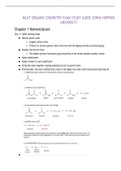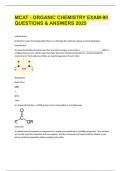Mcat organic - Study guides, Class notes & Summaries
Looking for the best study guides, study notes and summaries about Mcat organic? On this page you'll find 190 study documents about Mcat organic.
Page 3 out of 190 results
Sort by
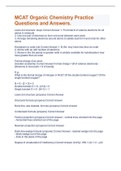
-
MCAT Organic Chemistry Practice Questions and Answers.
- Exam (elaborations) • 50 pages • 2023
-
- $8.99
- + learn more
Lewis dot structure: steps Correct Answer 1. Find total # of valence electrons for all atoms in molecule 2. Use one pair of electrons to form one bond between each atom 3. Arrange remaining electrons around atoms to satisfy duet for H and octet for other atoms Exceptions to octet rule Correct Answer 1. B, Be: may have less than an octet 2. Atoms with an odd number of electrons 3. Atoms in the 3rd period or greater (with d orbitals available for hybridization) may have greater than an octe...
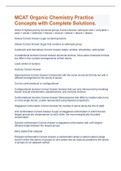
-
MCAT Organic Chemistry Practice Concepts with Complete Solutions.
- Exam (elaborations) • 37 pages • 2023
-
- $9.49
- + learn more
Order of highest priority functional groups Correct Answer carboxylic acid > anhydride > ester > amide > aldehyde > ketone > alcohol > alkene > alkyne > alkane Ketose Correct Answer sugar containing ketone Aldose Correct Answer Sugar that contains an aldehyde group Carboxylic acid derivatives Correct Answer esters, amides, anhydrides, carboxylate Constitutional isomers Correct Answer structural isomers, have same molecular formula but differ in the covalent...
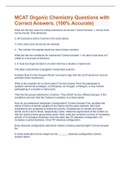
-
MCAT Organic Chemistry Questions with Correct Answers. (100% Accurate)
- Exam (elaborations) • 28 pages • 2023
-
- $9.49
- + learn more
What are the four rules for writing resonance structures? Correct Answer 1. Atoms must not be moved. Only electrons. 2. All resonance atoms must lie in the same plane. 3. Only valid Lewis structures are allowed. 4 . The number of unpaired electrons must remain constant. What are the two conditions for resonance? Correct Answer 1. An atom must have a P orbital or a lone pair of electrons. 2. It must be single bonded to an atom that has a double or triple bond. The latter comprom...
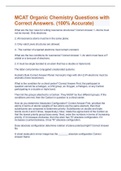
-
MCAT Organic Chemistry Questions with Correct Answers. (100% Accurate)
- Exam (elaborations) • 28 pages • 2023
-
- $9.49
- + learn more
What are the four rules for writing resonance structures? Correct Answer 1. Atoms must not be moved. Only electrons. 2. All resonance atoms must lie in the same plane. 3. Only valid Lewis structures are allowed. 4 . The number of unpaired electrons must remain constant. What are the two conditions for resonance? Correct Answer 1. An atom must have a P orbital or a lone pair of electrons. 2. It must be single bonded to an atom that has a double or triple bond. The latter comprom...
MCAT ORGANIC CHEMISTRY EXAM STUDY GUIDE JOHNS HOPKINS UNIVERSITY

-
MCAT Organic Chemistry Study Guide Complete Solution 2022/2023
- Other • 43 pages • 2022
- Available in package deal
-
- $10.49
- + learn more
MCAT Organic Chemistry Study Guide Complete Solution 2022/2023 MCAT Organic Chemistry Study Guide Complete Solution 2022/2023
MCAT - ORGANIC CHEMISTRY EXAM-90 QUESTIONS & ANSWERS 2025
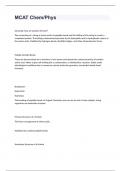
-
MCAT Chem/Phys questions n answers /passed
- Exam (elaborations) • 37 pages • 2024
- Available in package deal
-
- $19.99
- + learn more
MCAT Chem/PhysGenerally, how are proteins formed? The connecting of a string of amino acids via peptide bonds and the folding of this string to create a completed protein. The folding is determined primarily by the hydrophilic and/or hydrophobic nature of the amino acids. Stabilized by hydrogen bonds, disulfide bridges, and other intramolecular forces. Peptide (Amide) Bonds These are formed when the n-terminus of one amino acid attacks the carboxy terminus of another amino acid. Water is ...
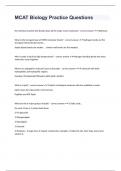
-
MCAT Biology Practice Questions with verified answers
- Exam (elaborations) • 55 pages • 2024
- Available in package deal
-
- $19.99
- + learn more
MCAT Biology Practice Questionsthe chemical reaction that breaks down all the major macro-molecules - correct answer Hydrolysis What is the strongest type of INTER-molecular bonds? - correct answer Hydrogen bonds are the strongest intermolecular bonds.... diople-dipole bonds are weaker. . . Vander wall bonds are the weakest. Why is water a liquid at high temperatures? - correct answer Hydrogen bonding bonds the water molocules closer together. What is an ampipathic molecule? give an Ex...
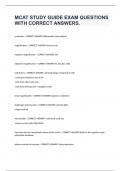
-
MCAT SOLUTION PACK EXAM QUESTIONS & ANSWERS.
- Package deal • 16 items • 2024
-
- $26.49
- + learn more
Exam (elaborations) MCAT Chemistry Final Exam Prediction Questions. Exam (elaborations) MCAT Organic Chemistry Written Exam. Exam (elaborations) MCAT Biology Practice Questions With Complete Solutions. Exam (elaborations) MCAT: Biochemistry Exam Questions & Answers. Exam (elaborations) MCAT: Sociology Review Practice Test. Exam (elaborat

How did he do that? By selling his study resources on Stuvia. Try it yourself! Discover all about earning on Stuvia

